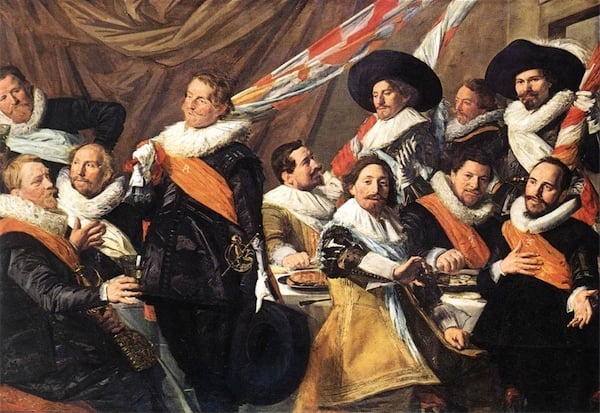
It is not enough when a man can say, “Oh, I labor, I have my craft,” or “I have my trade.” That is not enough. But we must see whether it is good and profitable for the common good, and whether his neighbors may fare the better of it.
—John Calvin, Sermons on the Epistle to the Ephesians (sermon on Eph. 4:26-28)(1558)
Today marks the five hundredth birthday of the Great Reformer, John Calvin. Among the many aspects of his enduring understanding of scripture, this passage on the Ephesians has an important place. It reminds us of the importance of service to the community as an aspect of faith. And it reminds us that comparable values were brought to America’s shores by the hardy group of Calvinist settlers who landed at Plymouth in 1620.
Frans Hals’s painting of a banquet for volunteer soldiers–known in Dutch as a schuttersmaal–is often studied and appreciated for the meticulous arrangement of the participants (ordered by rank), the array of silks (possibly woven in Haarlem, a center for the silk business), satins and other attributes of wealth and power that fill the canvas. The table is set for a virile feast: there is meat to be carved, and beakers for drink. The figures seem proud, rich and happy. So it is seen today. But perhaps that is not the intended message. Haarlem was occupied and brutalized by the Spanish during the religious wars, within the memory of the figures in this painting. Though devastated, the city opened it doors to Calvinists fleeing Spanish repression in Flanders, to the extent that in the era of Frans Hals the native populace was equaled or exceeded by refugee Flemings. What defines this amiable gathering of militiamen is a commitment to service to the community. These burghers have joined together to assure the defense of their community against the daunting military powers that threaten it–Catholic Spain, the Empire, later the French. Yet they are not professional soldiers; they are citizen soldiers. By day they are all men of business–traders, bankers, grain factors, craftsmen and artists. But they join together in the militia for purposes of protecting the city and for charitable service–their militia unit is actually attached to a church. Hals is commemorating the spirit of dedication to the common good that marked the golden age of the Netherlands and drove it to improbable heights. And he is reflecting the spirit of John Calvin.


